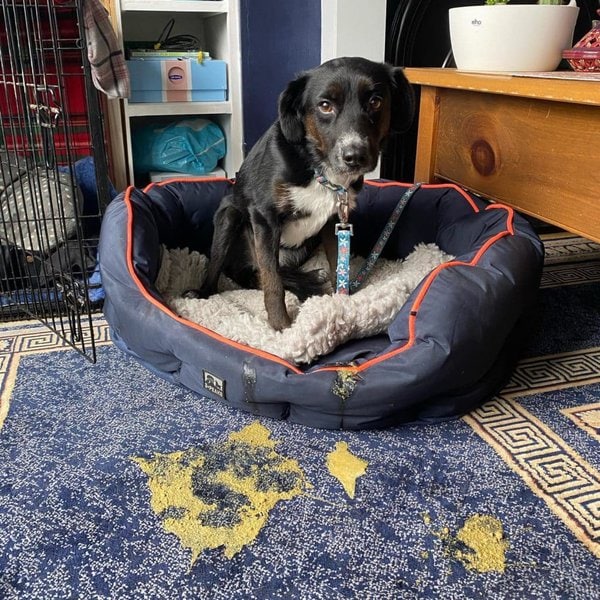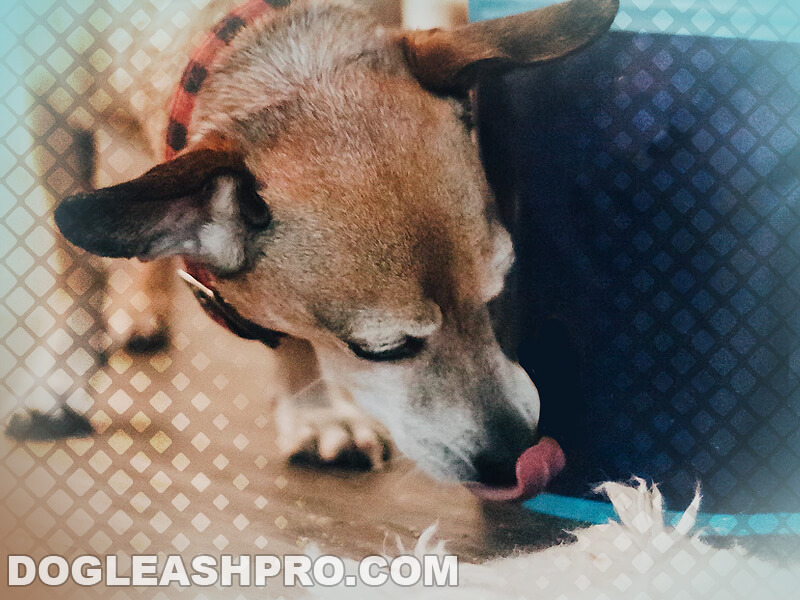Have you ever watched your furry companion curiously lick the floor, only to follow it up with a mouthful of grass? This might seem like a strange combination, but it’s actually a common behavior among dogs, often leaving owners scratching their heads. While it might seem quirky, there are several reasons why your dog might be indulging in these activities, and understanding them can help you provide the best care for your loyal friend.

Image: www.thegoodypet.com
This article will dive deep into the world of canine licking and grass eating, exploring the various reasons behind these behaviors. Whether your dog is a seasoned grass muncher or a newly-minted floor licker, we’ll unpack the potential explanations and provide insights into how to address any underlying issues.
The Mystery of the Licking Tongue
Licking, a natural instinct for dogs, serves a multitude of purposes. From cleaning themselves to expressing affection, it’s an integral part of their daily lives. When it comes to licking the floor, however, it can be a sign of several things:
1. The Taste of Curiosity:
Dogs have an incredibly sensitive sense of smell and taste. They might be exploring the world around them by sampling the flavors of their environment. Perhaps there’s a lingering scent of food, a spilled drink, or a curious chemical residue that piqued their interest. This is especially true for puppies who are learning about the world through their senses.
2. The Allure of Minerals:
Dogs may lick the floor due to a craving for minerals. Some floors contain traces of salt, which can be appealing to dogs, particularly those on a diet lacking sufficient electrolytes. This is similar to their attraction to salt licks in the wild.

Image: dogleashpro.com
3. The Comfort of Boredom:
If your dog is bored, they might find themselves engaging in repetitive behaviors like licking the floor. It can provide a sense of stimulation, especially when there’s nothing else going on.
4. The Urge for Attention:
Dogs are social creatures. Licking the floor could be a way to seek your attention. If they notice you react to their licking, they might repeat the behavior to gain your focus.
The Allure of the Green Grass
Just like floor licking, grass eating can be a common behavior among dogs, but it’s not always a cause for concern. Here are some common reasons why your dog might be eating grass:
1. The Hunger for Fiber:
Grass can help dogs regulate their digestive system. It provides fiber, which helps move food through their intestines and aids in digestion.
2. A Sensitive Stomach:
If your dog is experiencing indigestion or nausea, they might instinctively eat grass to induce vomiting. This is their body’s way of trying to relieve an upset stomach.
3. A Lack of Nutrients:
While commercially available dog food is carefully formulated, dogs might seek out grass as a source of essential nutrients that they might be lacking in their diet.
4. A Simple Matter of Taste:
Some dogs simply enjoy the taste of grass. Just like humans have their preferences, dogs might find it palatable and pleasurable.
When to Worry: Understanding the Red Flags
While occasional floor licking and grass eating are usually harmless, there are certain signs that might indicate a more serious issue. You should consult your veterinarian if your dog:
1. Exhibits Excessive Licking:
If your dog is licking the floor constantly, to the point where their skin is irritated or raw, it’s essential to seek veterinary attention. Excessive licking can be a sign of underlying anxiety, allergies, or even pain.
2. Shows Signs of Gastrointestinal Distress:
If your dog is vomiting or experiencing diarrhea alongside grass eating, it could be a symptom of a more significant digestive issue. Consult your veterinarian to rule out any underlying medical conditions.
3. Has a Change in Appetite:
If your dog’s appetite suddenly changes, whether decreased or increased, it’s essential to pay attention. This can indicate an underlying health problem that requires veterinary intervention.
4. Exhibits a Loss of Energy or Lethargy:
Sudden weight loss or a decrease in your dog’s usual energy levels can be a sign of a serious health condition. It’s crucial to seek veterinary attention promptly.
Addressing Licking and Grass Eating: A Holistic Approach
If your dog’s floor licking and grass eating are a result of boredom, you can try enriching their environment with more toys, puzzles, and interactive games. This will provide them with mental stimulation and prevent them from seeking entertainment in less desirable ways. You can also try training them to perform tricks and commands, which can provide a sense of purpose and satisfaction.
If you suspect that your dog’s licking and grass eating are related to nutritional deficiencies, consider talking to your veterinarian about supplementing their diet. They can provide guidance on the proper nutrients and dosage to ensure your dog’s well-being.
For cases of anxiety, there are several options available. You can try training your dog to relax in stressful situations or using calming products such as pheromone sprays or supplements. It’s also crucial to address the source of your dog’s anxiety, whether it’s a fear of loud noises, separation anxiety, or something else. The key is to identify the trigger and work towards desensitizing your dog to it, if possible.
Why Is My Dog Licking The Floor And Eating Grass
Final Thoughts
Understanding why your dog licks the floor and eats grass can help you better care for their well-being. Whether it’s a sign of boredom, a lack of nutrients, or a simple case of curiosity, it’s important to observe your dog’s behavior and address any potential issues. If you have any concerns, don’t hesitate to consult your veterinarian for a professional assessment.
By understanding these behaviors and taking steps to improve your dog’s health and well-being, you can ensure that your furry friend has a happy and fulfilling life.






